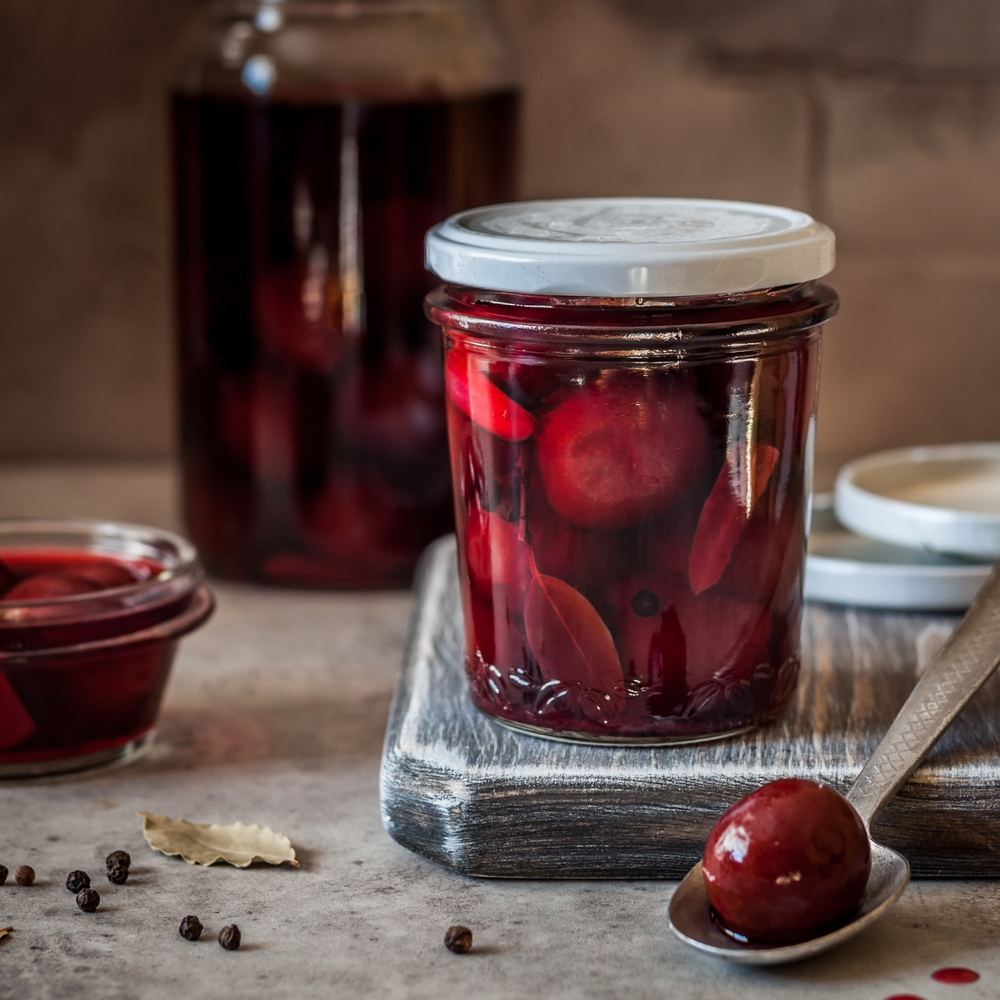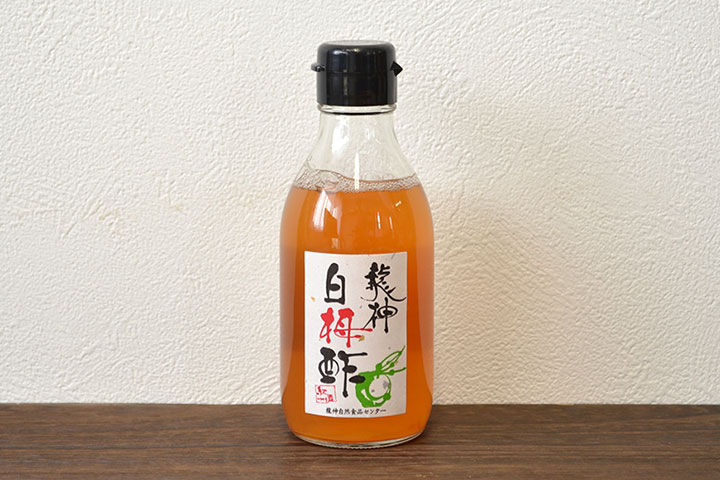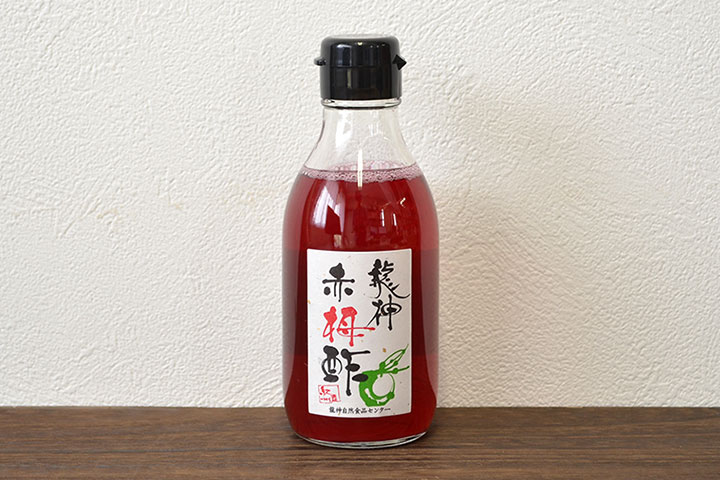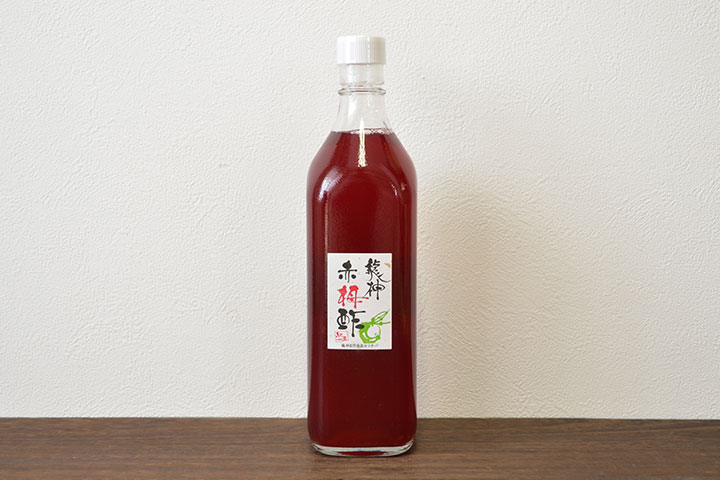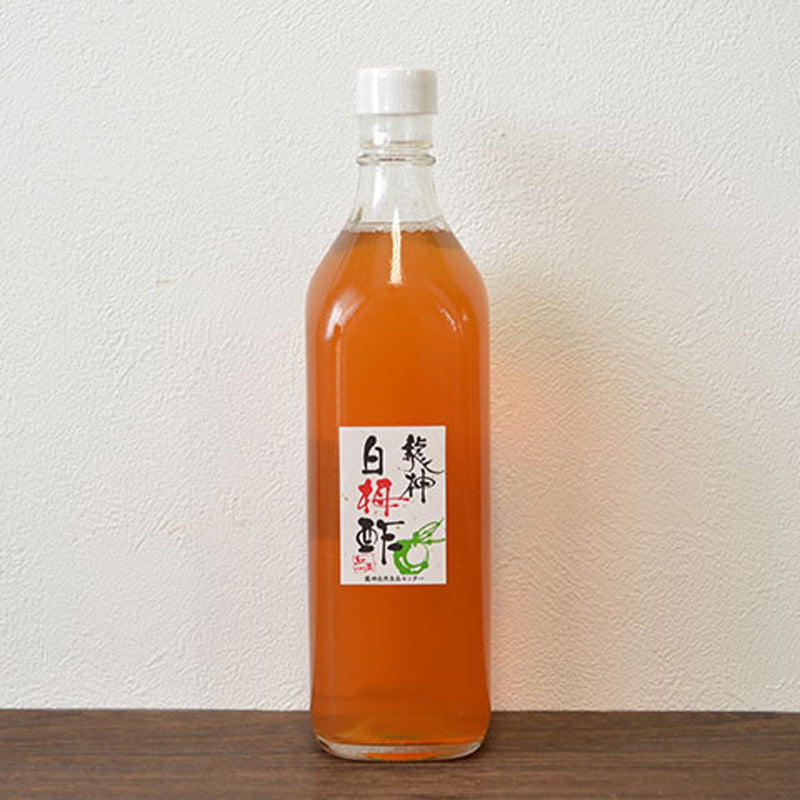
Ryujin White Plum Vinegar- made from organic, pesticide-free cultivation 700 ml
In stock
Brine from natural pickling: Ryujin White Plum Vinegar
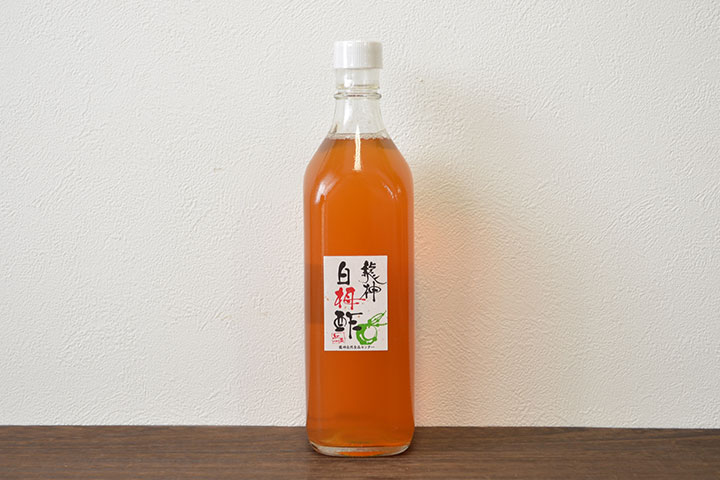
Ryujin Plum vinegar is cultivated without the use of chemical fertilisers or pesticides. This zesty palate-cleansing flavour is obtained from a natural process of extracting white vinegar from raw and unripe plums.
The traditional method of producing pickled plums and plum vinegar have been passed on for years. Only a few manufacturers still use organically grown plums to extract plum vinegar. In fact, many plum vinegars sold commercially use red dye, citric acids, and commercial salt, which distorts its natural medicinal effects.
Organic agricultural practices are often more complicated (and take longer) than using pesticides to manage crops. Therefore, there is a limit to how much can be produced. This plum vinegar is notable for its high nutritional value and special cultivation methods without using pesticides. In the same way, the organic price tag more closely reflects the true cost of growing the food.
Red and White Plum Vinegar: What's their difference?
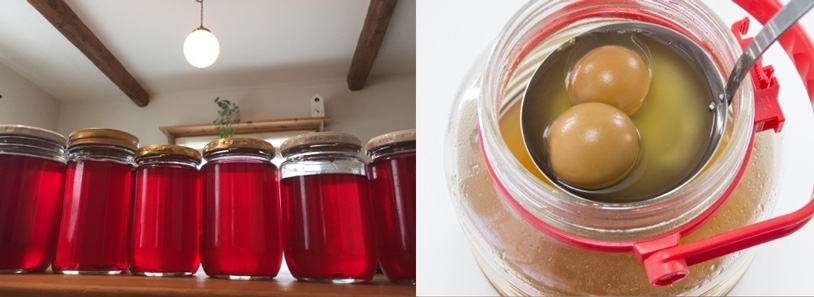
There are two types of plum vinegar, "white umezu" and “red umezu”. The white plum vinegar is the first batch of vinegar that emerges from pickled umeboshi (plums) whereas the "red umezu" is red vinegar with its colors deriving from red perilla leaves.
White plum vinegar is perfect when you want a subtle scent of plums whose colour and taste will not overpower the dish. The simple flavor combination of plums and salt makes it an easy condiment for pairing.
Red plum vinegar contains the scent and ingredients of red perilla. It is believed that red plum vinegar is more nutritious due to the high medicinal properties of red perilla. The red vinegar is fruity and salty. It makes for a perfect salad dressing, or a nice base ingredient to experiment with in the kitchen. It also is an important ingredient for making Japanese pickles such as pickled radish or sakura.
At Ryujin, raw and unripe plums are harvested for plum vinegar. They are selected carefully by hand. For red plum vinegar, plums are set aside for ripening before adding Shiso leaves to produce red brine.
Is it Safe for Consumption?
Ryujin is devoted to using natural repellent and foliar application to replace synthetic pesticides and chemical fertiliser. This helps to control problems with fruit trees without compromising the crop. By producing additive free products, we deliver delicious red plum vinegar that is not only safe for consumption, but also enjoyable for the entire family.
Origin of Ryujin plum

From the highest mountain in Kishu of Wakayama Prefecture towards the vast open valley of Hidakawa river, resides the nature and history of Ryujin Plum. There are about 1,600 plum trees in this 3-hectare field in Umeno.
Without the use of pesticides or chemical fertilizers, plums are cultivated the old-fashioned way by using natural composts such as tree bark. Ryujin village is filled with the inviting fragrance of plum blossoms.
Ryujin Plum produces more than 50 tons of products every year. Don't miss this opportunity to taste the cultivation through nature with uncompromising quality.

What is Umeboshi Vinegar and How to Use it
Prized for its unique nutrient profile, Umeboshi is a highly salted pickled plums that's been a beloved part of the Japanese diet for centuries.
In this article, we introduce the composition of Umeboshi Vinegar, ways the vinegar acts as an accent to a variety of dishes and compare types of Umeboshi Vinegar.
Read more
How To Make Umeboshi
Known for its distinctive sourness, this summer fruit is usually served as a side dish with rice or as a filling for rice balls in bentos for breakfast and lunch. Homemade umeboshi is so much more delicious than store bought, so why not check out this column for a crash course of umeboshi, its health benefits, important points to take caution and try out more creative recipes.
Read more
Health benefits of Plum Vinegar
Born by natural fermentation, plum vinegar is rich in organic acids such as citric acid, malic acid, polyphenol and more. Due to its abundance of nutrients, no wonder people from all over the world are pivoting towards umeboshi vinegar.
One of the efficacy of umeboshi vinegar is the prevention of food poisoning. Plum vinegar contains about 20% salt and about 4% citric acid. Thus, the combination of both have a strong bactericidal effect and to ward off food poisoning.
The polyphenols contained in plum vinegar is a scintillating element. First, it has antiviral effects towards influenza virus, cold labialis, polio, hand-foot-and-mouth disease, and norovirus. Next, anti-inflammatory effects especially towards chronic inflammation.
The myriad of antioxidant ingredients such as "polyphenol", "vitamin E", and "plum lignan" helps to slow down aging as well as suppressing or repairing DNA mutations that lead to the development of cancer.
Finally, plum extract not only reduces LDL cholesterol level in the blood (arteriosclerosis caused by fat in the blood), it also helps to improve blood flow, thereby suppressing hypertension and rising blood pressure.
Customer Testimonials

Remedy for heat stroke prevention
The summer sun is unforgiving, therefore heat exhaustion is common. Plum vinegar is known as a source of antioxidants that helps to soothe internal inflammation. Besides, this product is great for vegetable pickling.
Momo (Around 40 years old, Female)

Great as a condiment for Cooking
The refreshing acidity means a little goes a long way. It adds a special touch to my cooking!
Shoko(Around 40 years old, Female)

Drink for Health
Plum Vinegar is a big part of my morning routine. Simply combine a few teaspoon of plum vinegar with water. It's not overwhelming at all and I will continue to do so for my health.
Sayaka (Around 30 years old, Female)
Process of Harvesting Plum Vinegar
Plum vinegar is extracted at a certain point in the process of regular umeboshi making.
Process
1. Harvesting
We harvest raw and unripe plums for plum vinegar. They are selected carefully by hand. Later, they are set aside to allow ripening.
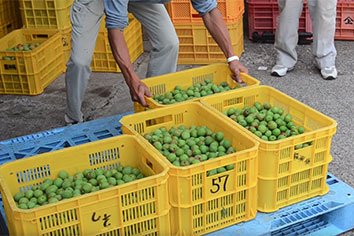
2. Salting
Like ordinary umeboshi making, plums are salted to produce plum extract. As it is a time-consuming process, frequent checks on the plums are vital every few days.
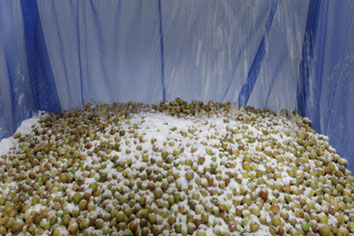
3. White Plum Vinegar extracted
The white plum vinegar extract are filled with nutrients plenty. The colour is clear and transparent.
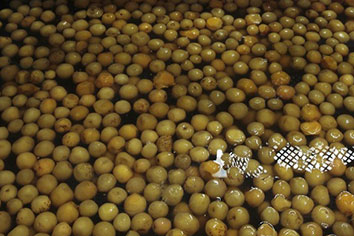
Recipes for Plum Vinegar
Here are a few examples of how to use umeboshi vinegar for an unforgettable condiment journey:
Plum Vinegar Drink
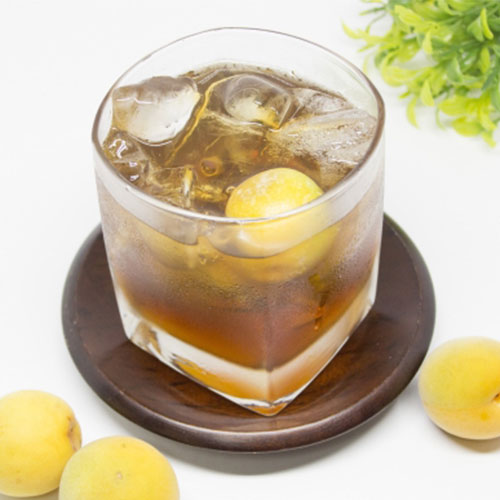
Ingredients
- ・Plum Vinegar
- 1 teaspoon
- ・Honey
- 2 teaspoons
- ・Cold Water
- 100 ml
- ・Ice cubes
- optional
Steps:
- 1
- Combine and stir in honey and plum vinegar.
- 2
- Add chilled water and ice. Drink is ready to serve!
Pickled Cucumber
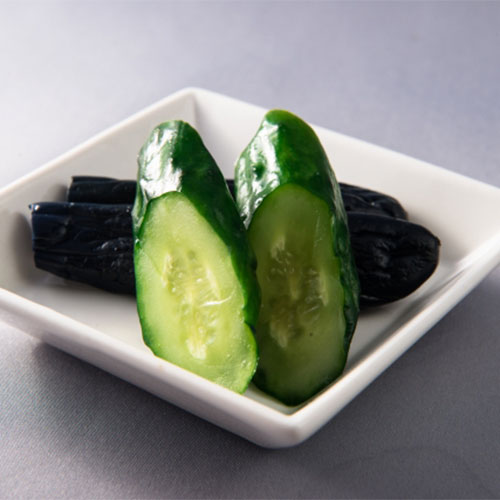
Ingredients
- ・Eggplant
- 2
- ・Cucumber
- 1
- ・Plum Vinegar
- 1 tablespoon
- ・Soy sauce
- 1 tablespoon
- ・Salt
- reasonable amount
Steps:
- 1
- Cut the eggplant and cucumber into a bite size.
- 2
- Salt the eggplant and cucumber. Wait patiently for the salt to draw out the water from the vegetables via osmosis. Squeeze with both hands and let dry.
- 3
- Mix eggplant and cucumber with plum vinegar and soy sauce.
- 4
- Let sit in the refrigerator for an hour.
Product Variations
Please enjoy the product variations of Ryujin Plum Vinegar.
Product Details
| Product Name | Ryujin White Plum Vinegar- made from organic, pesticide-free cultivation 700 ml |
|---|---|
| Ingredients | Plum (produced in Wakayama Prefecture), salt (Shimamazu Okinawa Prefecture) |
| Net weight | 700 ml |
| Storage Method | Keep in cool dark place |

Why shop with KAWASHIMAYA?
- We sell only authentic and high-quality products
- 100% Made in Japan products are as listed
- Organic and non-GMO products are as listed
- All products are new and have long expiry date
- All products are handled directly from our warehouse in Tokyo, Japan
- Easy and secure payment options with CC or PayPal
- Safe and insured international shipping methods
- English and Japanese customer support by email
- Wholesale discount prices available for selected products
- Find insightful articles from KAWASHIMAYA Blog
- Get exclusive discounts for KAWASHIMAYA Newsletter subscribers
- Easy shop on KAWASHIMAYA Amazon USA

